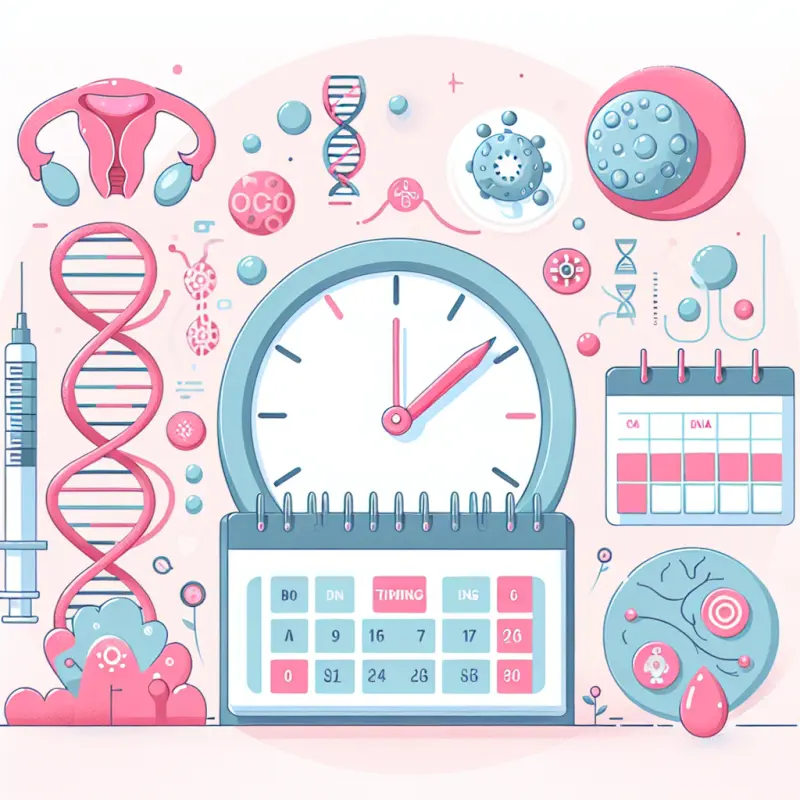Epigenetic Factors Affecting Menstrual Cycle Timing

Epigenetic Factors Affecting Menstrual Cycle Timing
Introduction
The menstrual cycle, a complex interplay of hormones, is a fundamental aspect of female reproductive health. While the average menstrual cycle is approximately 28 days, it can vary significantly among individuals due to various factors. Traditionally, these variations have been attributed to genetic, environmental, and lifestyle influences. However, recent research has illuminated the role of epigenetic factors in regulating menstrual cycle timing. Epigenetics, the study of heritable changes in gene expression that do not involve alterations to the underlying DNA sequence, provides a nuanced understanding of how external and internal factors can influence the menstrual cycle. This article explores the epigenetic mechanisms impacting menstrual cycle timing, their implications for women's health, and the potential for targeted interventions.
Understanding the Menstrual Cycle
The menstrual cycle is a series of hormonal changes that prepare the female body for pregnancy. It is divided into several phases:
- Menstrual Phase: Shedding of the uterine lining occurs if pregnancy does not take place.
- Follicular Phase: Hormones stimulate the growth of ovarian follicles.
- Ovulation: Release of an egg from the ovary.
- Luteal Phase: The post-ovulation phase characterized by the production of progesterone.
These phases are regulated by a fine-tuned hormonal orchestra involving the hypothalamus, pituitary gland, and ovaries. Disruptions in this cycle can lead to menstrual disorders such as amenorrhea, oligomenorrhea, and polymenorrhea.
The Role of Epigenetics
Epigenetics involves modifications that affect gene expression without altering the DNA sequence. These modifications include:
- DNA Methylation: The addition of methyl groups to DNA, typically suppressing gene expression.
- Histone Modification: Changes to the proteins around which DNA is wrapped, affecting gene expression.
- Non-coding RNAs: RNA molecules that regulate gene expression post-transcription.
These mechanisms allow cells to respond dynamically to environmental cues and are crucial in development, differentiation, and disease processes.
Epigenetic Influence on Hormonal Regulation
Hormones play a pivotal role in the menstrual cycle, and their regulation is subject to epigenetic modifications:
- Estrogen and Progesterone Receptors: DNA methylation and histone modifications can alter the expression of receptors for these hormones, affecting their signaling pathways.
- GnRH and LH/FSH Secretion: Epigenetic changes can influence the synthesis and release of gonadotropin-releasing hormone (GnRH), luteinizing hormone (LH), and follicle-stimulating hormone (FSH), thereby altering cycle timing.
Environmental and Lifestyle Factors
External factors can induce epigenetic changes affecting the menstrual cycle:
- Stress: Chronic stress can lead to epigenetic modifications in genes related to the hypothalamic-pituitary-adrenal (HPA) axis, affecting menstrual regularity.
- Diet and Nutrition: Nutrient availability and diet composition can influence DNA methylation patterns, impacting hormone levels and cycle timing.
- Physical Activity: Exercise has been shown to induce epigenetic changes that might influence reproductive hormone levels and menstrual regularity.
Developmental and Intrauterine Influences
Epigenetic programming during critical developmental windows can have lasting effects on menstrual cycle regulation:
- Fetal Programming: Exposure to hormones, nutrition, and stress during fetal development can result in epigenetic modifications that influence menstrual health in adulthood.
- Early Life Stress: Childhood trauma and stress can lead to lasting epigenetic changes in stress-related genes, potentially affecting menstrual cycle regularity.
Clinical Implications
Understanding the epigenetic factors influencing menstrual cycle timing has significant implications for women's health:
- Diagnosis and Treatment of Menstrual Disorders: Identifying specific epigenetic markers can aid in the diagnosis of disorders such as polycystic ovary syndrome (PCOS) and amenorrhea.
- Fertility Treatments: Epigenetic insights can guide personalized approaches to fertility treatments, improving success rates.
- Preventive Strategies: Lifestyle interventions targeting epigenetic modifications may help in maintaining regular menstrual cycles and preventing associated health issues.
Future Directions
The field of epigenetics is rapidly evolving, with promising avenues for further research:
- Epigenome-Wide Association Studies (EWAS): Large-scale studies to identify epigenetic variations associated with menstrual cycle irregularities.
- Interventional Studies: Assessing the impact of lifestyle modifications on epigenetic markers and menstrual health.
- Pharmacological Approaches: Developing drugs targeting specific epigenetic modifications to treat menstrual disorders.
Conclusion
Epigenetic factors provide a vital link between genetic predispositions, environmental influences, and menstrual cycle regulation. As research progresses, a deeper understanding of these mechanisms will enhance our ability to diagnose, treat, and prevent menstrual disorders. By integrating epigenetic insights into clinical practice, we can move toward more personalized and effective approaches to women's reproductive health.
In conclusion, the exploration of epigenetic factors affecting menstrual cycle timing represents a promising frontier in reproductive medicine. As we continue to unravel the complexities of epigenetic regulation, the potential for innovative interventions and improved health outcomes becomes increasingly attainable.